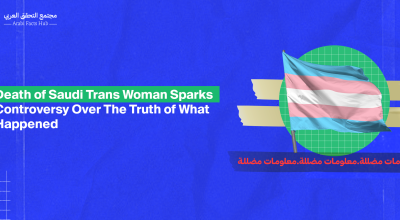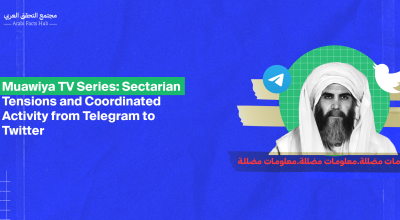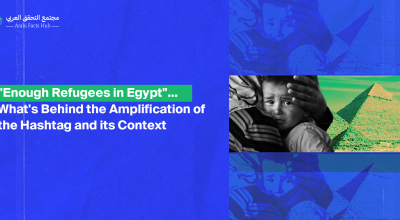A campaign against the “naturalization of refugees” in Egypt... What is the story?
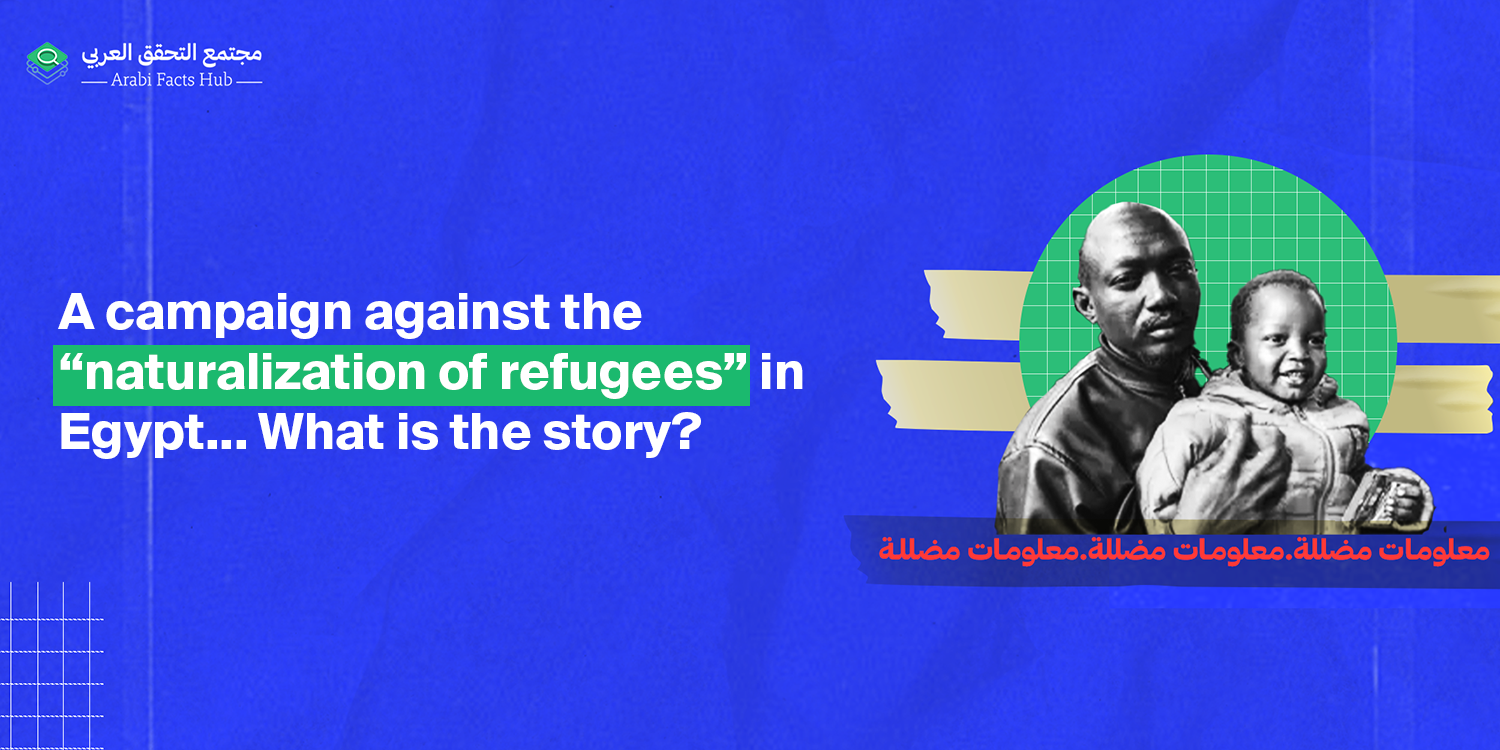
This is part of a series of investigative reports published in collaboration with Daraj media
On March 8, the Egyptian government announced amendments to the conditions for granting citizenship to foreigners, including financial deposits, investment, and real estate purchases in US dollars. The announcement sparked widespread controversy in the country, which is facing a crisis in foreign exchange reserves. In parallel, an online campaign rejecting the decision was active on Twitter. The campaign was launched by accounts linked to nationalist groups hostile to the presence of foreigners and refugees in Egypt. The campaign relied on a hashtag supported by accounts that were mainly involved in campaigns carrying the same [nationalist] message over the past years.
What happened?
The Egyptian government has recently eased controls for granting Egyptian nationality to foreigners. These were introduced through the House of Representatives and passed into law in 2019. The new rules include allowing those applying for naturalization to pay the required amounts in installments, and grant applicants temporary residence in the country until payment is complete within a year.
In 2020, foreigners had to pay $500,000 USD in real estate investment [to obtain naturalization]. The recent decision reduced the required amount to $300,000. This prompted the sudden appearance of a new hashtag rejecting the government’s decision, which rose on the list of most discussed topics in Egypt. Under the hashtag #Against_resettlement_and_naturalization_of_refugees, there were 2045 original tweets, 2794 retweets, and 8972 likes.
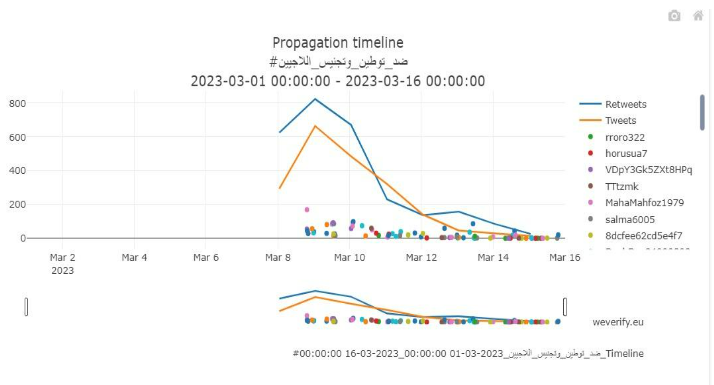
InVID figure showing activity periods of the hashtag #against_resettlement_and_naturalization_of_refugees
Most Tweeted... Active accounts in previous campaigns lead the campaign
Between 8 to 17 March, 651 accounts participated in enhancing tweets on the hashtag. Some of these accounts were prominently active in previous anti-refugee campaigns in Egypt. These accounts use pharaonic images and symbols for their profile pictures in addition to the Egyptian flag and some stock photos. Ranked by highest number of tweets are the following accounts: @Egyptian_soul22 – 223 tweets, @Ramses25248456 – 210 tweets, @Egyptia78842940 – 130 tweets, @mosaaiid – 96 tweets, @Egyptianhiklxzp – 83 tweets, @DashDas84990808 – 60 tweets, @WafaaAdel58 – 55 tweets, @TamerAl46106825 – 46 tweets, @Almhagr251 – 44 tweets.
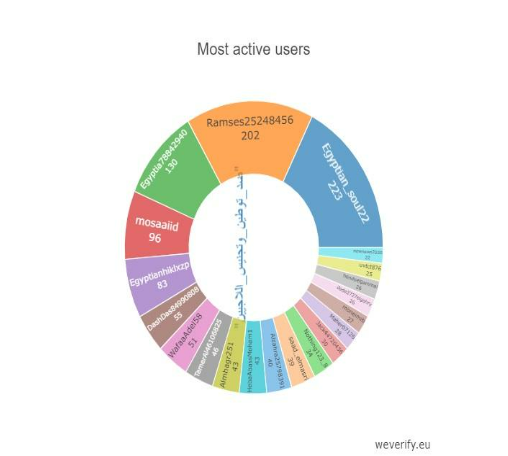
InVid figure showing the highest tweeting accounts on the hashtag #against_resettlement_and_naturalization_of_refugees
A comparison shows that the accounts active in the current campaign are almost the same accounts that were very active last summer in the campaign #Enough Refugees In Egypt We Are Fed Up.
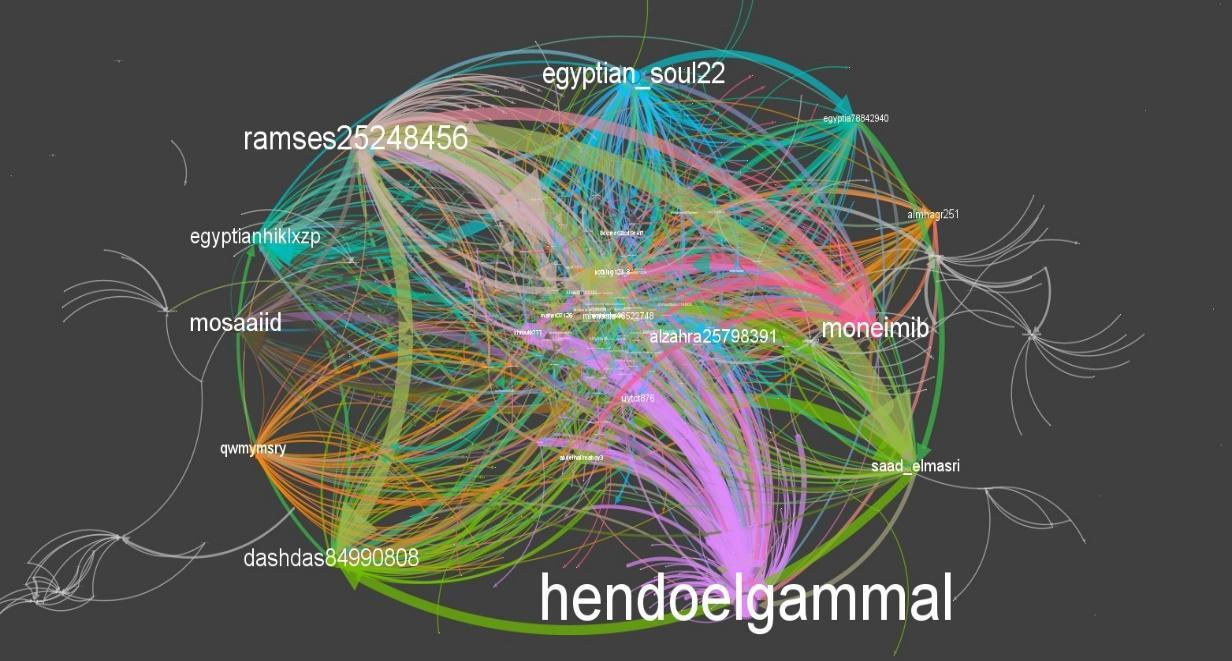
Gephi figure showing active accounts on the hashtag #Against Resettlement and Naturalization of Refugees
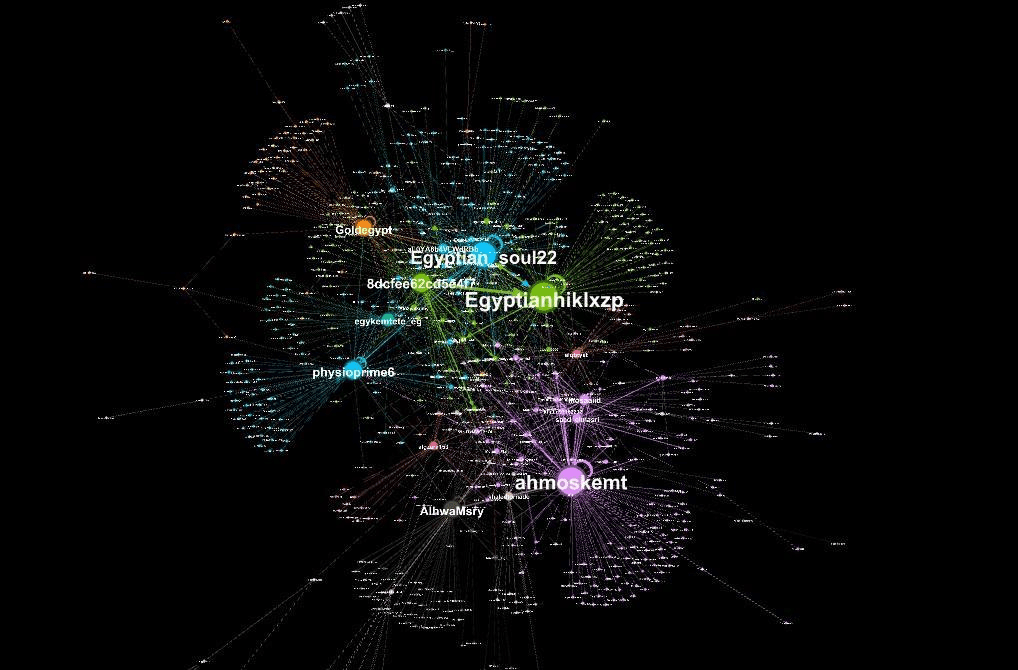
Gephi figure showing active accounts using the hashtag #Enough Refugees In Egypt We Are Fed Up
Hind Al Shawaf - Who is behind the first tweet?
The first tweet posted on the hashtag was from the account @Egypthiklxzp at 7:27 pm on March 8.
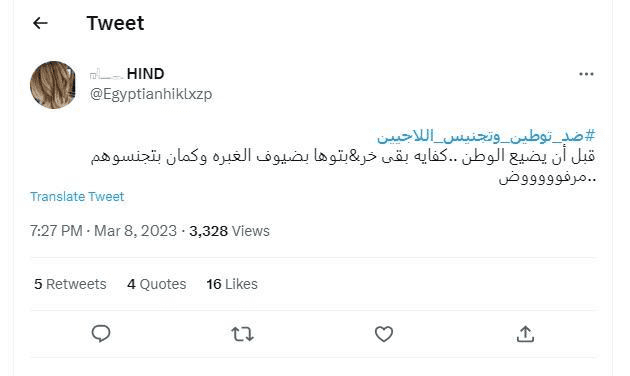
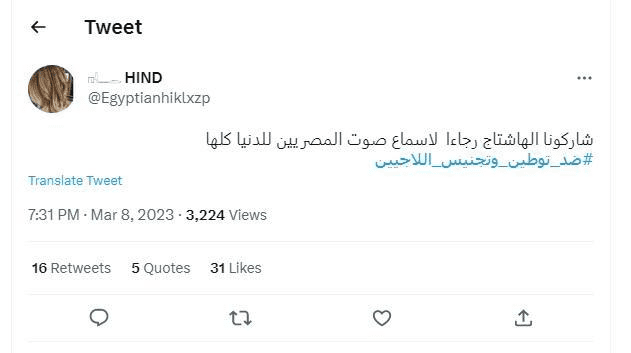
The account, created in August 2012, identifies itself as Hind. Several accounts participating in the hashtag also bear the name Hind, which brings back to memory the name Hind Al Shawaf.
Hind has previously launched campaigns rejecting the presence of refugees and calling for their expulsion from Egypt, the most prominent of which was through the hashtag #Enough Refugees In Egypt We Are Fed Up, which she launched on 24 June, 2020 and is still active to this day.
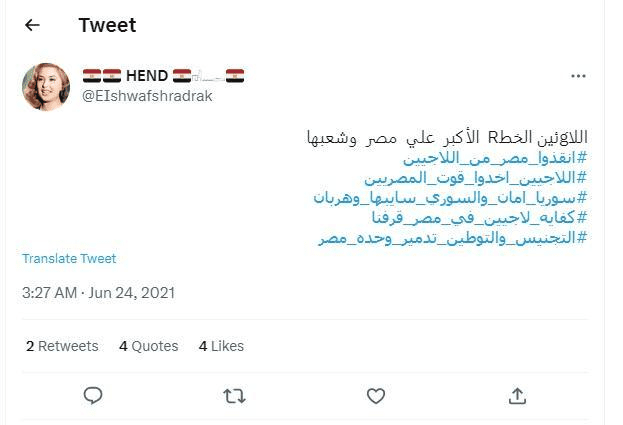
Through research, we found that Hind changed the handle of her account which she used to post the previous tweet several times. The account changed from @EIshwafmtyecIqx to @EIshwafkmitqupr and then @EIshwafshradrak.This could have been an attempt to evade Twitter's flags against inauthentic account activity.
It was also remarkable that Hind gave the account @EIshwafshradrak some rest, and did not use it to contribute to the hashtag #against settlement and naturalization of refugees, but rather used her account @Egypthiklxzp to tweet on that hashtag.
It is worth noting that Arabi Facts Hub had analyzed the hashtag #Enough Refugees In Egypt We Are Fed Up, last summer revealing the most prominent accounts influencing it, the nature of interactions on it, and Hind’s role in its launch.
Who is Hind Al Shawaf?
According to her Facebook account, Hind Al-Shawaf holds a BA in the Arabic Language. She runs pages and groups, such as “Our Army is Light of Our Eyes” which has 9,000 followers. A closed group called “We are all the Egyptian Army” is linked to the page.
Hind has two other Twitter accounts, @hanzada474 and @HendElshwaf_2, but they were shut down by Twitter. Hind has an email on her page “Our Army is the Light of Our Eyes” which contains the same handle as one of theTwitter accounts.
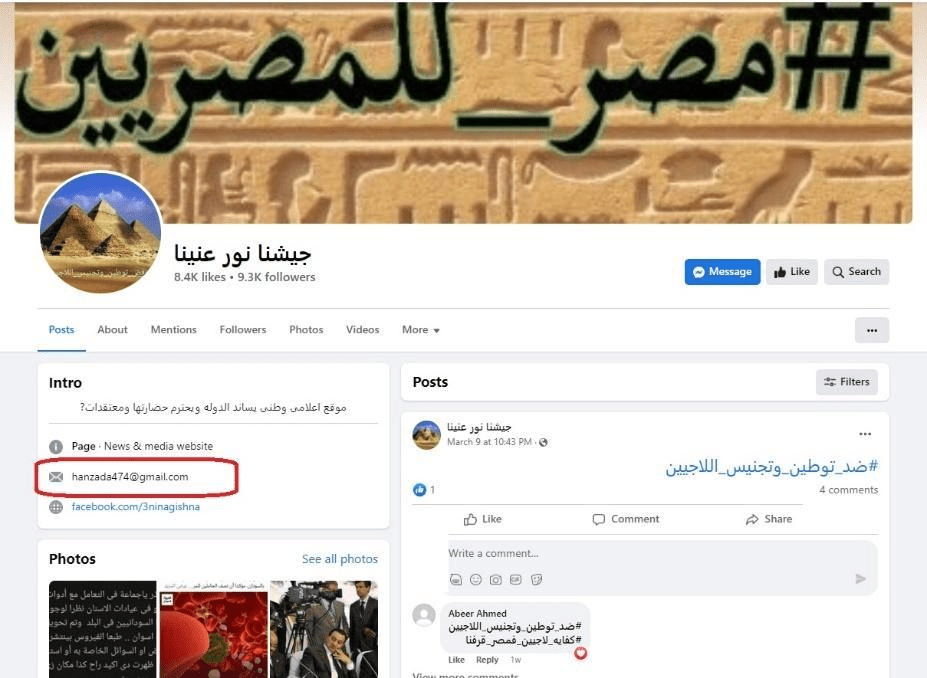
On her social media pages, Hind expresses her support for the army and President Abdel-Fattah El-Sisi. She mourns the days of former President Hosni Mubarak’s rule and rejects the resettlement of refugees in Egypt. She also criticizes the Muslim Brotherhood, which she accuses of killing her 16-year-old son, without disclosing any details of how that happened.
But how did we know that Hind Al Shawaf was the one who launched the hashtag rejecting the government's decision containing measures to facilitate the acquisition of Egyptian nationality by foreigners? We found an old tweet from her @Egypthiklxzp account, which was in response to a tweet from the account of “the maestro”, or Bassem Bekhit, whose role in launching online campaigns supporting government policies and attacking government critics we have already revealed in previous analyses.
Bassem Bekhit, who runs a plastic factory in Ain Shams, Cairo, used to mock Hind Al Shawaf and others, saying he had succeeded in attacking them via a hashtag he created with the group of accounts associated with him.
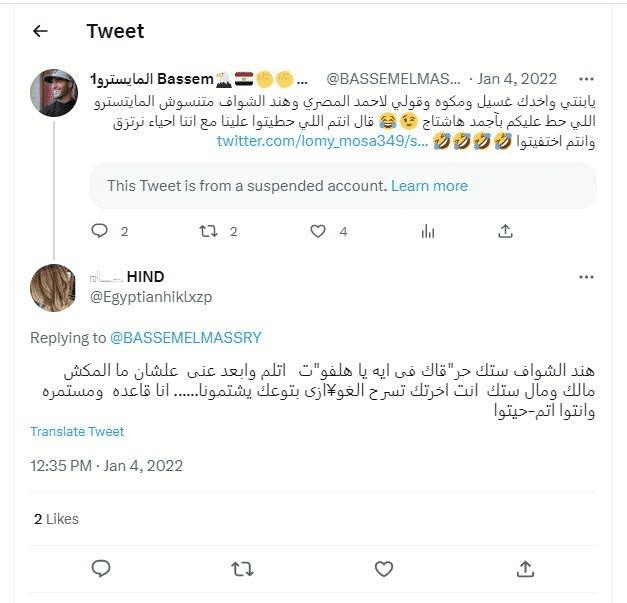
Some of the tweets in the hashtag cited the “government’s stupidity” as participating accounts criticized the decision, Others offered advice on how to increase reach of the hashtag so that it becomes a trending topic, as in the tweet below.
Some accounts referred to European policies aimed at curbing the flow of refugees, and referred to statements from Britain and Belgium while criticizing that Egypt should be left to deal with the crisis.

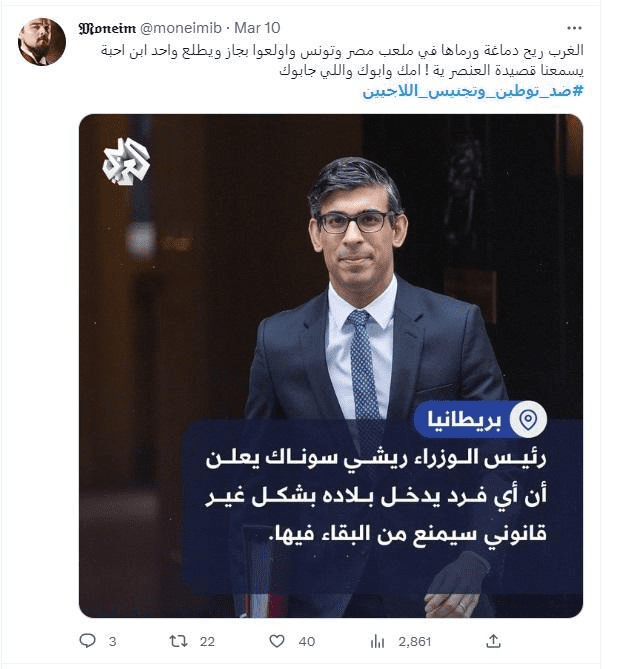
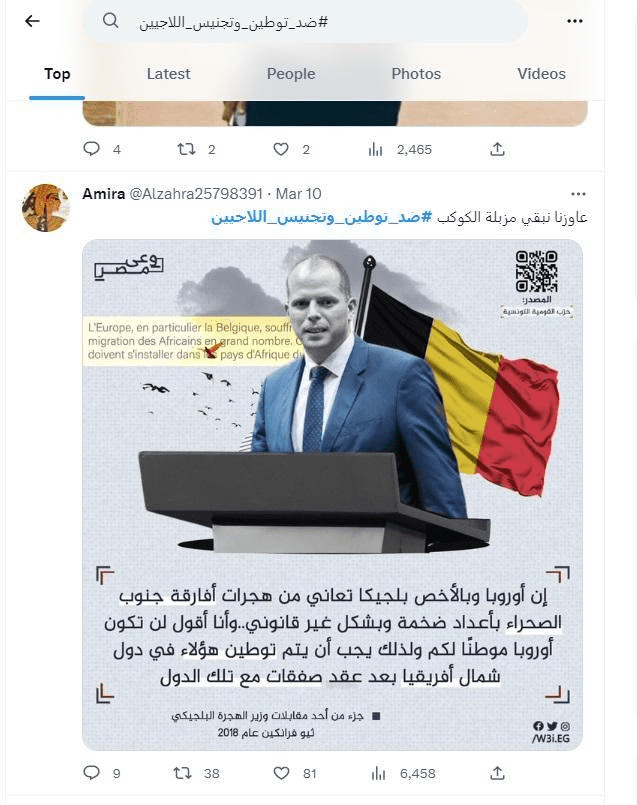
Facebook: Nationalist Pages Fueling Citizenship Rejection Sentiment
On Facebook, there are pages spreading ideas and nationalist sentiments strongly biased towards everything Egyptian. These pages often focus on the status of Egyptian civilization and the uniqueness of an Egyptian ethnicity, similar to extreme right-wing movements in the West.
Although the number of followers of these pages is not considered large, one of them has garnered tens of thousands of followers (named 'Awareness of Egypt'). Despite their focus on launching campaigns against refugees, they have previously been involved in attacking Egyptian politicians such as activist Alaa Abd El-Fattah and former presidential candidate Abdel Moneim Aboul Fotouh, in addition to praising certain government policies.
This time, the pages (which operate under a common umbrella comprising at least 10 Facebook pages) did not launch hashtags directly related to the government's recent decision. However, each of them has posted at least one entry discussing the ongoing controversy surrounding the decision to grant Egyptian citizenship to foreigners.
These posts were based on previous statements made by the late Egyptian writer Wahid Hamed, lawyer Khaled Abu Bakr, and media personality Amr Adib.
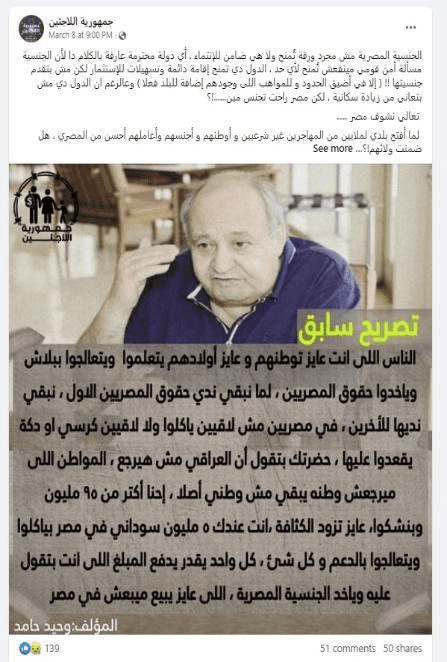

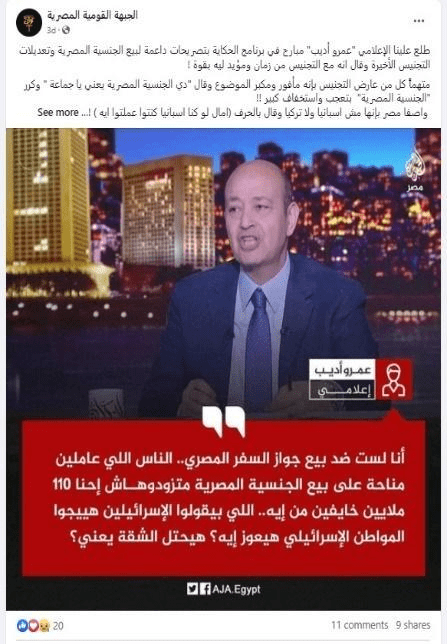
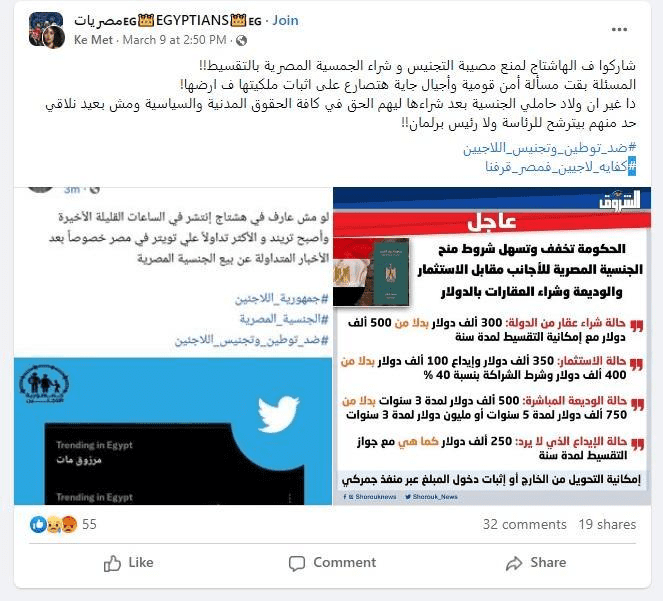
In summary
- Accounts and pages organized a campaign to reject the government's decision regarding foreigners acquiring Egyptian citizenship.
- The accounts participating in the campaign are owned by real individuals who do not disclose their personal identities and instead use Ancient Egyptian names and symbols.
- The accounts are interconnected and operate within the same network.
- Many accounts, owned by a single person, are shared from one campaign to another.
- The active parties in promoting the campaign have played a similar role in previous campaigns attacking foreigners and refugees and rejecting their presence in Egypt.
- The hashtags have gained significant reach among both government supporters and its critics.
- There were attempts to amplify the campaign through replies and retweets containing the hashtags, surpassing the number of original tweets.
- Pages adopting nationalist ideas have written posts on the subject but have not launched specific hashtags to express their rejection of the government's decision.
- The campaigns draw parallels with strict European policies against immigrants and refugees, such as the current British policy.
Tools used:
InVID Verification Plugin
Twitter Search
Gephi






